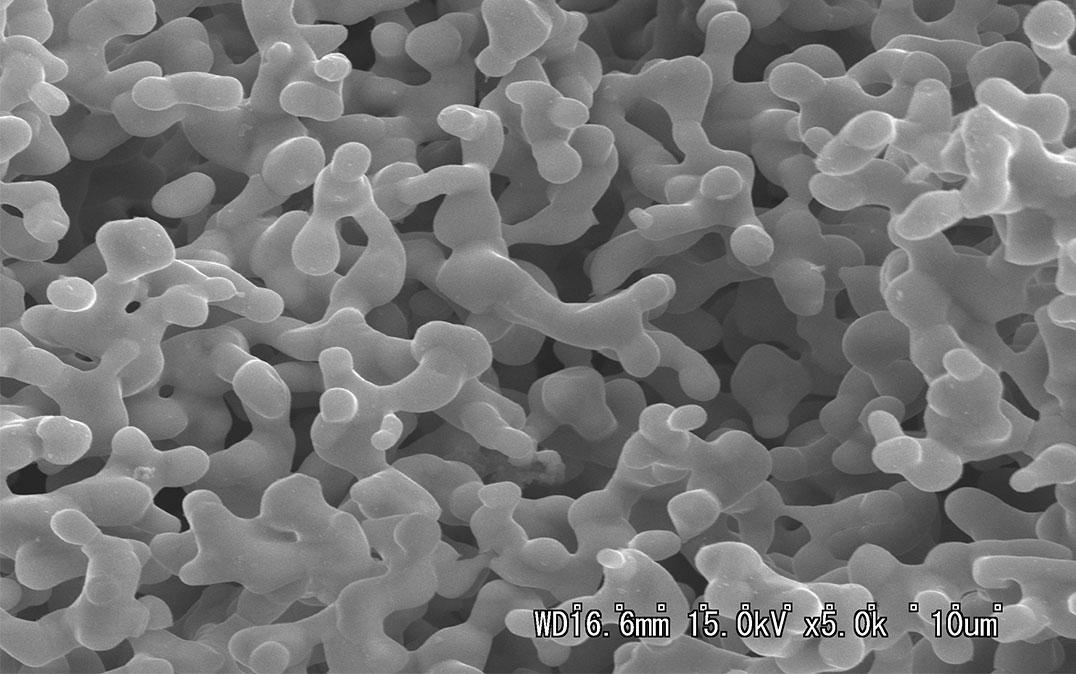Research News
Polymer Coating Accelerates Fuel Production

Researchers from the University of Tsukuba and Osaka University find that a polymer coating can effectively shuttle CO2 molecules to a metal catalyst, thus accelerating its product formation and offering potential greenhouse gas recycling strategies
Tsukuba, Japan—It is well-established that the accumulation of greenhouse gases, like carbon dioxide (CO2), in the atmosphere contributes to climate change. Therefore, CO2 capture and recycling are vital for mitigating detrimental environmental effects and addressing the climate crisis. Recently, researchers from Japan designed a polymer-coated metal catalyst that accelerates CO2 conversion and offers green energy insights.
In a study published in ACS Catalysis, researchers from the University of Tsukuba describe porous tin (Sn) catalysts coated with polyethylene glycol (PEG) and show how this polymer facilitates CO2 transformation into a useful carbon-based fuel.
Various polymers can capture CO2 molecules, and Sn catalysts are known to reduce CO2 to other molecules, like formate (HCOO-), which can be reused to power fuel cells.
"We were interested in combining these capabilities into a single catalytic system that could scrub CO2 from its surroundings and recycle it into formate," says research group leader, Professor Yoshikazu Ito. "However, it's difficult to obtain only the desired product, formate, at a high production rate and in high yield, so we had to fine-tune the catalyst design." The formate production rate of PEG-coated Sn was 24 times higher than that of a conventional Sn plate electrode, and no byproducts were detected (>99% yield of formate). To understand this enhanced CO2-reduction reaction, the researchers fabricated an Sn catalyst coated with another CO2-capturing polymer (polyethyleneimine; PEI) whose structure interacts differently with incoming CO2. The PEG-coated Sn still outperformed the PEI-coated Sn, and considering the chemical characteristics of these polymers, the authors proposed that PEI held the CO2 molecules too tightly, whereas PEG struck a key balance in capturing and then releasing CO2 to the catalytic Sn core.
"Modeling this reaction using theoretical computations confirmed the favorability of PEG shuttling CO2 to the Sn center and explained the accelerated formate production," explains PhD student, Samuel Jeong. "However, we wanted to further clarify the PEG-CO2 interactions."
More detailed computations revealed that while the absence of polymer limits the Sn catalyst's CO2-capture ability, an excessively dense layer of PEG inhibits CO2 transfer to the metal surface, thereby decreasing formate production. Therefore, a complete but relatively sparse layer of PEG is optimal for funneling CO2 to Sn, while maintaining a CO2-rich environment and preventing byproduct release.
The mantra "reduce, reuse, recycle" no longer only refers to single-use plastics. The simple catalyst-coating technique reported by Ito and co-workers can be used to develop systems that efficiently recycle CO2 into useful compounds, like formate, which can power fuel cell devices that provide green electricity.
###
This work was sponsored by a JSPS Grant-in-Aid for Scientific Research on Innovative Areas "Discrete Geometric Analysis for Materials Design" (Grant Nos. JP20H04628 and JP20H04639), the JSPS KAKENHI (Grant Nos. JP21H02037 and JP19K15505), the Futaba Research Grant Program of the Futaba Foundation, KONDO-ZAIDAN, and a cooperative program (Proposal No. 202011-CRKEQ-0001) of the CRDAM-IMR, Tohoku University, the Open Facility, Research Facility Center for Science and Technology, University of Tsukuba.
Original Paper
The article, "Polyethylene Glycol Covered Sn Catalysts Accelerate the Formation Rate of Formate by Carbon Dioxide Reduction," was published in ACS Catalysis at DOI: 10.1021/acscatal.1c02646
Correspondence
Associate Professor ITO Yoshikazu
Faculty of Pure and Applied Sciences, University of Tsukuba
JEONG Samuel
PhD student, Graduate School of Pure and Applied Sciences, University of Tsukuba
Related Link
Faculty of Pure and Applied Sciences








